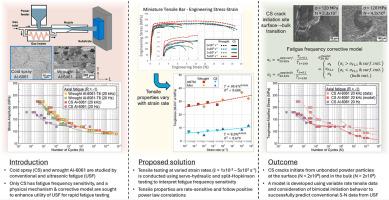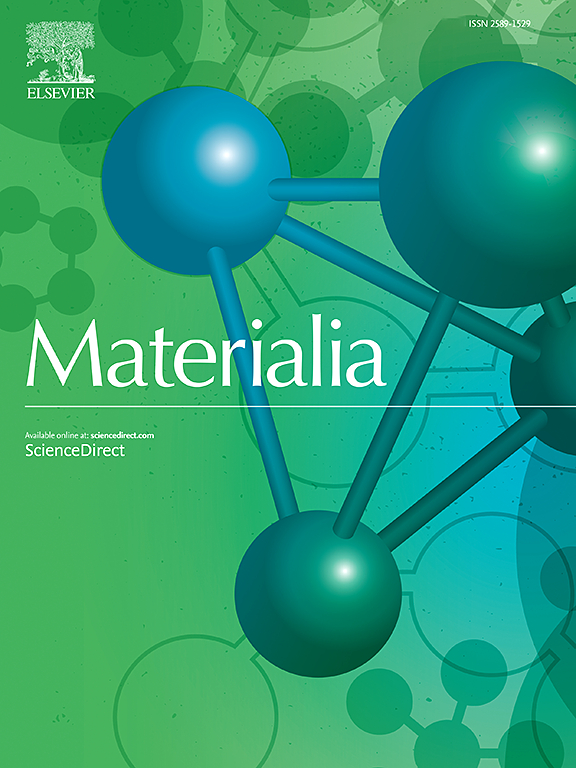Ultrasonic and conventional fatigue behavior, strain rate sensitivity, and structural design methods for wrought and cold spray Al-6061
IF 3
Q2 MATERIALS SCIENCE, MULTIDISCIPLINARY
引用次数: 0
Abstract
Cold spray is an additive manufacturing process that accelerates powder particles to supersonic speeds to create repairs and bulk depositions with fine-grained microstructures, high density, and good mechanical properties. Fatigue property measurement for these novel materials is critical for their use in safety-critical components, which can be accelerated with the use of ultrasonic fatigue testing. In this work, ultrasonic (20 kHz) and conventional (20 Hz) fatigue studies were conducted on as-sprayed bulk Al-6061 and conventional wrought Al-6061-T6. Complementary fatigue studies of surface preparation (surface finish and residual stress) and fatigue specimen geometry (round versus flat), as well as hole-drilling residual stress measurements, were undertaken to minimize the influence of these confounding variables. Cold spray Al-6061 exhibits fatigue frequency sensitivity, whereas the wrought material does not. Tensile testing at varied strain rates indicates that a portion of the fatigue frequency effect can be attributed to strain rate sensitivity. Fractographic studies show that crack initiation occurs from unbonded powder particles at the surface at high stress amplitude, and transitions sub-surface at lower stress amplitude. The results of these studies were used to create frequency-corrective models of S-N data and Kitagawa-Takahashi diagrams that can be used to design for fatigue crack initiation and growth resistance.

锻造和冷喷 Al-6061 的超声波和传统疲劳行为、应变速率敏感性以及结构设计方法
冷喷是一种快速成型制造工艺,可将粉末颗粒加速到超音速,从而形成具有细粒度微结构、高密度和良好机械性能的修复和批量沉积物。这些新型材料的疲劳性能测量对其在安全关键部件中的应用至关重要,而使用超声波疲劳测试可以加速这种测量。在这项工作中,对喷涂的块状 Al-6061 和传统锻造的 Al-6061-T6 进行了超声波(20 kHz)和传统(20 Hz)疲劳研究。对表面处理(表面光洁度和残余应力)和疲劳试样几何形状(圆形与扁形)以及钻孔残余应力测量进行了补充疲劳研究,以尽量减少这些干扰变量的影响。冷喷 Al-6061 具有疲劳频率敏感性,而锻造材料则没有。在不同应变速率下进行的拉伸测试表明,疲劳频率效应的一部分可归因于应变速率敏感性。裂纹研究表明,在高应力振幅下,裂纹从表面未结合的粉末颗粒开始产生,而在较低应力振幅下,裂纹则向表面下过渡。这些研究结果用于创建 S-N 数据的频率校正模型和北川-高桥图,可用于疲劳裂纹萌发和生长阻力的设计。
本文章由计算机程序翻译,如有差异,请以英文原文为准。
求助全文
约1分钟内获得全文
求助全文
来源期刊

Materialia
MATERIALS SCIENCE, MULTIDISCIPLINARY-
CiteScore
6.40
自引率
2.90%
发文量
345
审稿时长
36 days
期刊介绍:
Materialia is a multidisciplinary journal of materials science and engineering that publishes original peer-reviewed research articles. Articles in Materialia advance the understanding of the relationship between processing, structure, property, and function of materials.
Materialia publishes full-length research articles, review articles, and letters (short communications). In addition to receiving direct submissions, Materialia also accepts transfers from Acta Materialia, Inc. partner journals. Materialia offers authors the choice to publish on an open access model (with author fee), or on a subscription model (with no author fee).
 求助内容:
求助内容: 应助结果提醒方式:
应助结果提醒方式:


